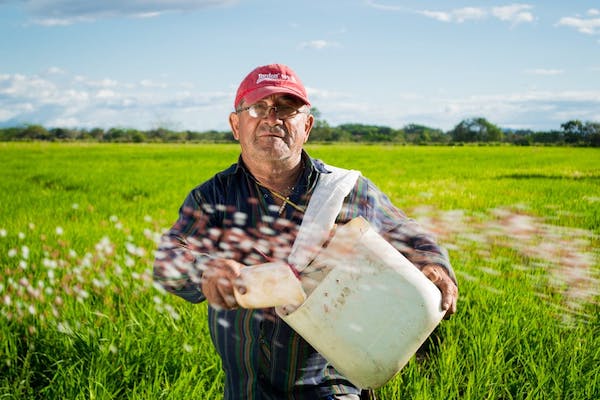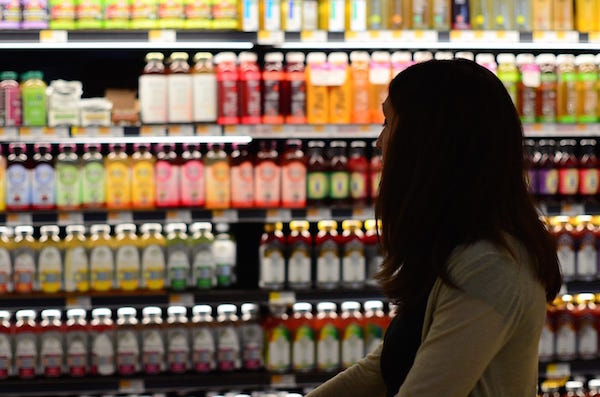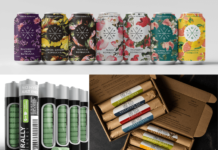
Over the last five to ten years, food consumers have been seeking more “premium” experiences from the food they purchase, including better connections with their food and understanding where it comes from. One way this has manifested itself is interest in CSAs and farmers’ markets, allowing people to support local businesses and connect directly with the people growing their food.
However, most consumers still get most of their food from the grocery store, and it is difficult to scale farmers’ markets and CSAs to reach as many consumers as grocery stores do. Thus, CSAs and farmers’ markets may not be viable options for farmers looking for markets for their products. And some farmers might not want to deal directly with customers.
Our answer: someone needs to build a brand.
Brands help tell the story in a concise, relatable way for consumers. As Patrick Mateer talks about on our podcast, Seal the Seasons has their place-based story built into their brand. By flash freezing produce and distributing it via a branded product in grocery and convenience stores in the community where it is grown, they are meeting consumers where they are at while giving wholesale produce farmers access to a market that they would not have otherwise, and at a premium.
Brands also bring alignment across activities, including marketing tactics across channels, so that packaging, advertisements, in-store demos and social media are all communicating the same message and working towards the same goal. Building a brand also means aligning production capacity to meet the consumer demand generated by the brand. Seal the Seasons adds production capacity as their brand footprint expands into new regions and aligns their marketing tactics to support their growth into those new regions, allowing their packaging innovation in the frozen category to help them stand out.
However, building a brand is hard work, and a lot of things go into it. It is not just your friend designing a logo for your packaging or coming up with a clever tagline to go underneath that logo. Good brand building is built on an understanding of your target customer and what problems you are solving for them. Good brand building is strategic, and in the case of food, is informed by the trends in the category in question as well as a competitive analysis so your brand can stand out as defensibly unique.
Developing brands for agricultural products can help farmers produce products that earn them a premium and are meeting a real consumer demand. We want to encourage more partnerships between farmers and brand-oriented food entrepreneurs where it makes sense so that all consumers have access to tasty, fresh food.
And now, our roundup of the best food and beverage finance news, events and resources from around the web…
Business Model Insights
- The Founders of RXBar, Acquired by Kellogg for $600 Million, Built the Company by ‘Having a Bias Toward Action’ (Entrepreneur) – “People in the beginning said the world doesn’t need another protein bar. We looked at traditional grocery stores and realized we can’t compete there. That barrier to entry in that market set our strategy: to sell into CrossFit gyms and be the product that’s designed for them. We built the business in the field every week and throughout this whole time we were out sampling at events. In that process you learn how to pitch the product, what people like and how to market it. It’s really valuable data you’re collecting. We made a brief to the designers, saying people like RXBar because of its minimal ingredients. People don’t buy it because of the brand name. We knew we had to do it a little differently, because the category was competitive.”
- A Century-Old Dairy Ditches Cows For High-Tech Plant Milk (NPR)
- Stand out by standing up: The role of mission in business (New Hope Network)

Raising Capital
- 4 questions to ask when vetting prospective investors (New Hope Media) – “While investors spend hours conducting diligence on companies and founders, it’s also important for founders to give due diligence to prospective investors. But how? Ask these four questions to properly conduct investor diligence: 1. Is the investor’s vision aligned with yours? 2. Does their experience and knowledge match what you need? 3. Do they have a credible network? 4. How are their relationships with their current portfolio companies?”
- A Farm Lender’s Perspective (Successful Farming)
- 5 Common Reasons Why VCs Decide Not To Invest (Fast Company)
CPG/National Brands
- How (and why) to make your brand story memorable (New Hope Media) – “We all receive 100,000 words and 34 GB of information a day. But what do we remember? We remember what we learned from a story. Stories are what inform our culture; they inform our business, and they inform our lives. A brand story resonates because it conveys a critical change, some insight or shift that is particularly relevant to the audience. Optimally, your company has a culture of storytelling and you are gathering these stories from your customers to inform and even change how you are telling the bigger story.”
- The CPG Squeeze: With Big Retailers Pushing Private-Label Goods, Brands Are Being Forced To Respond (CB Insights)
- 5 strategies that set ‘genius’ digital marketers apart from the pack (Food Navigator)

Market Trends
- Consumers are demanding more from their beverage experiences (FoodDive) – “In the Beverage Industry’s 2018 product development outlook, 62% of U.S. consumers are seeking natural beverage options, a shift reflected in part by the soda category’s continued decline and the rapid growth of organic drinks. In 2025, the segment is expected to top $55 million and grow at a compound annual growth rate of 13%, according to a report by Grand View Research. There’s a shift toward consumers viewing beverages as a sort of preventative nutrition occasion. People are interested in functionality, and instead of asking ‘What’s in this bottle,’ they’re asking ‘What is this bottle doing for me?’”
- 43% of Millennials shop frozen more frequently (Refrigerated and Frozen Foods)
- USDA: Farmers’ markets pose no threat to grocery stores (FoodDive)
Farming and AgTech
- From apple-picking robots to machine learning — the ag-tech sector could soon have its first ‘unicorns’ (Business Insider) – “Ag-tech is exploding and venture capitalists are diving in. According to Pitchbook, venture capital firms, including heavyweights like GV (formerly Google Ventures) and Monsanto’s VC arm, sank more than $1 billion into the industry in 2017, up from $823 million in 2016. Since 2014, VC’s have dumped close to $3 billion into the sector, which is becoming increasingly present in the farming world.”
- 9 ways your brand can support the regenerative movement (New Hope Media)
- Harvesting Robotics Market to Reach $5.5bn From Early Adopters Alone (AgFunder News)

Deals/M&A
- Nutrition Capital Network: January 2018 Deal Download (New Hope Media) – “The nutrition and health and wellness industry saw a 27 percent increase in transaction activity in 2017, with the number of mergers and acquisitions up 37 percent and equity financings up 21 percent compared to 2016, according to Nutrition Capital Network (NCN). Full results of NCN’s annual deal analysis are available to the network’s investor-members, but suffice to say 2017 improved dramatically on the record highs of the prior two years.”
- ‘Unconventional’ M&As change future of cold food industry (Refrigerated and Frozen Foods)
- Why Is Pay Lagging? Maybe Too Many Mergers in the Heartland (New York Times)
Industry Events
- NatchCom (Various Orgs) – $, 2/9 – 2/11 in Boulder, CO
- Creating a Food Safety Culture (Wisconsin Manufacturing Extension Partnership) – Free, 2/14, online
- Entrepreneurons – Startup Serendipity and Strategy (WARF) – Free, 2/19 in Madison, WI
- Growing Profits on Vegetable and Livestock Farms (MOSES) – $, 2/22 in La Crosse, WI
- Moses Organic Farming Conference (MOSES) – $, 2/23 – 2/24 in La Crosse, WI
- FaBcap Starter – How To Start A Food Business (FaB Wisconsin) – $, 2/27 in Madison, WI
- Expo West (New Hope Network) – $, 3/8 – 3/11 in Anaheim, CA
- Buy Local, Buy Wisconsin Grant Application (Wisconsin DATCP) – Free to apply, 3/9 online
- Good Food Expo (FamilyFarmed) – $, 3/24 – 3/25 in Chicago, IL
- National Good Food Network Conference (Wallace Center) – $, 3/27 – 3/30 in Albuquerque, NM
- Techstars Farm to Fork Accelerator Due (Techstars) – Free to apply, 4/8 online
- Fearless Farm Finances Workshop (MOSES) – $, 4/27 in Wisconsin Dells, WI
- Smart Food Expo (Various Orgs) – $, 6/25 -6/27 in Chicago, IL






